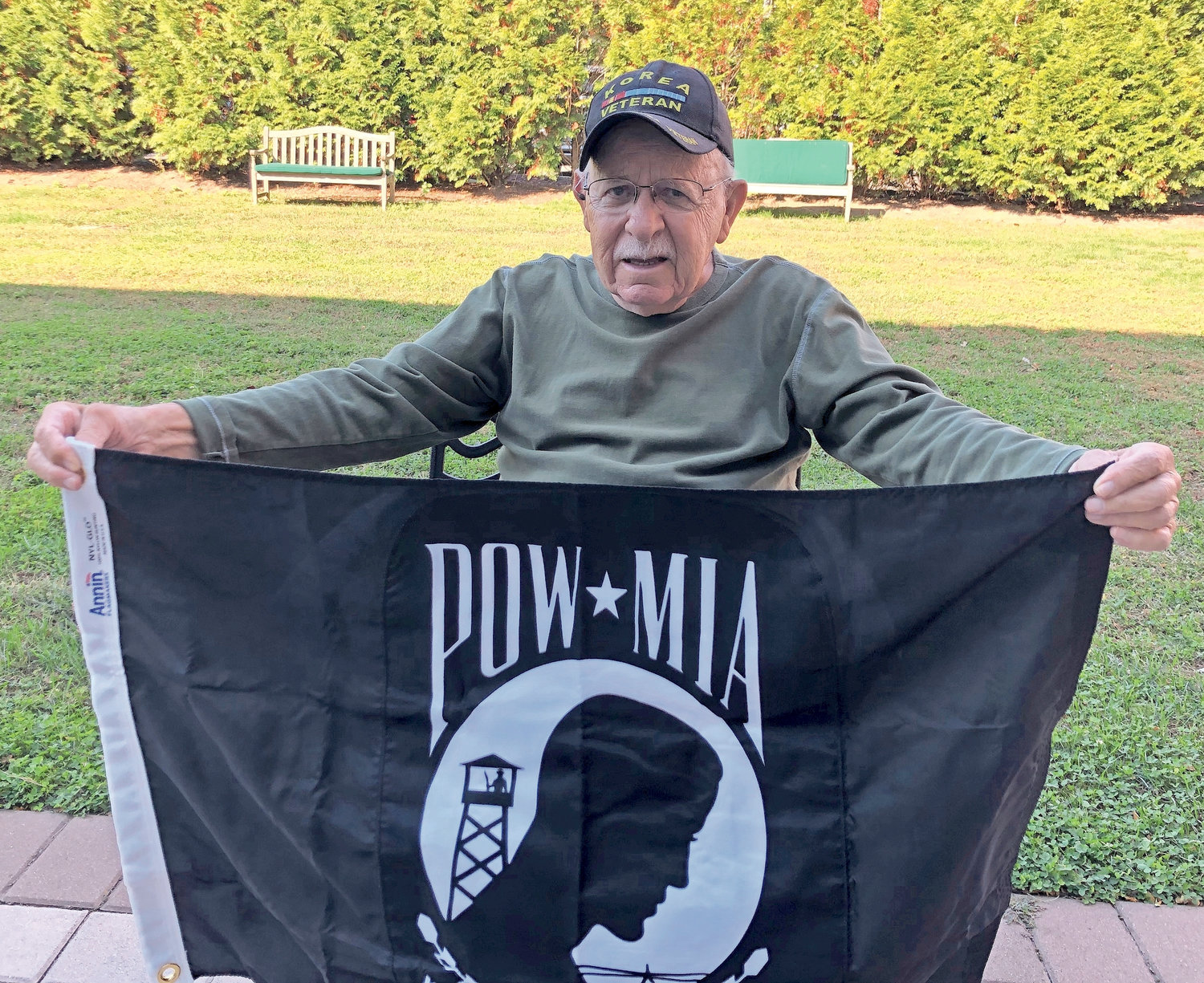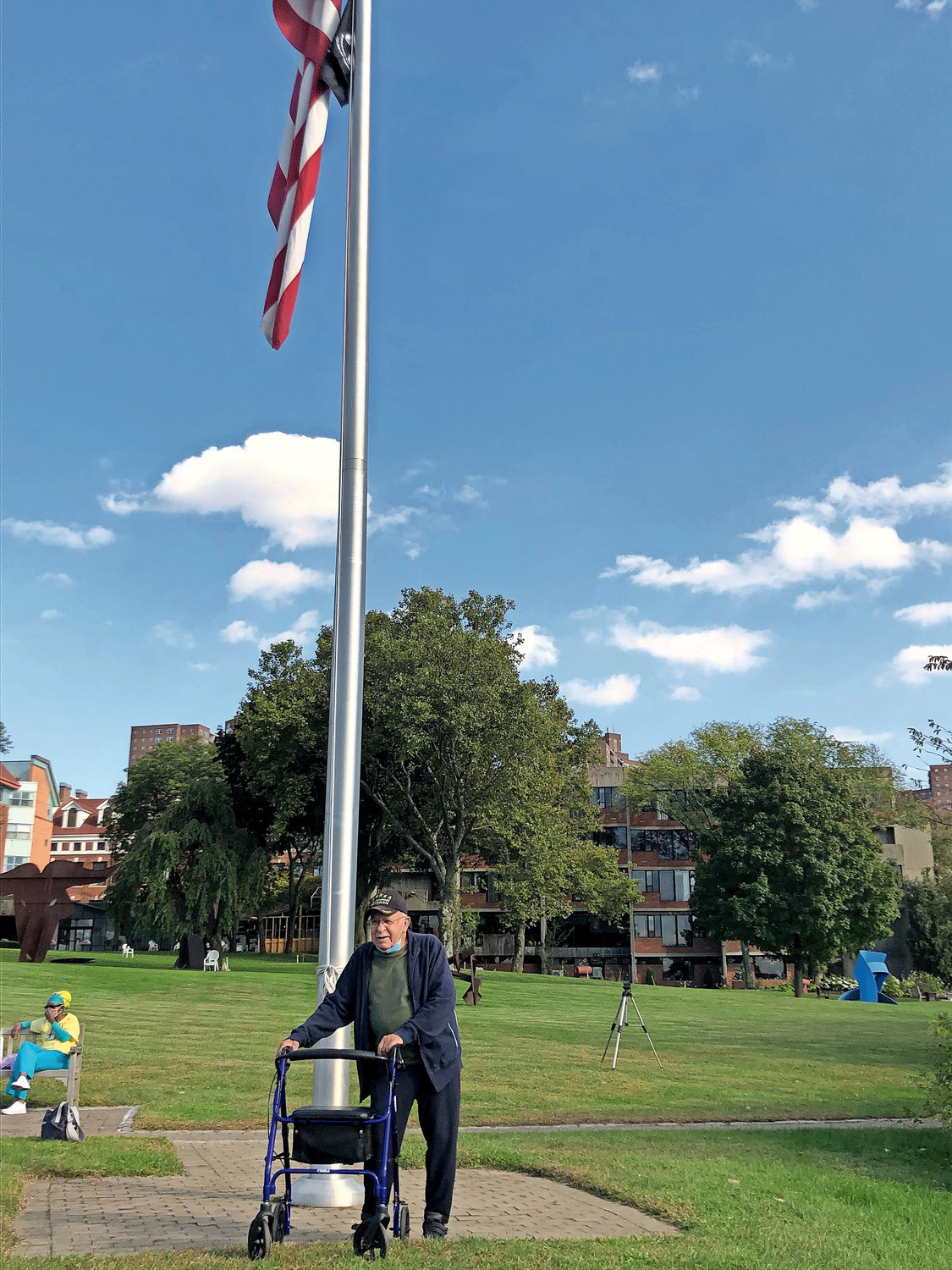Merrick vet holds flag for those left behind
Ninety-year-old Irving Liebowitz isn’t exactly fond of change. In fact, the few times he’s endured it was only because life gave him little choice.
He’s lived the last 58 years in Merrick, raising his three children, and creating a home with his wife, Claire.
But kids grow up, friends and family grow older, and sometimes life deals the most difficult moments, like Claire’s passing more than a decade ago from breast cancer. Liebowitz found a way to persevere. But 2020 presented its own challenges.
First, Liebowitz found himself taking up temporary residence in the Hebrew Home of Riverdale’s RiverWalk community, while recovering from a broken hip. And then, when the coronavirus invaded, residents were cut off from their routines and prevented from spending time with family and friends.
“For three months, we were like prisoners,” Liebowitz said. “We had everything we needed in our apartments, but we couldn’t leave. There were all these precautions beginning in March because no one was quite sure what to do. So the safest thing we could do was stay inside.”
But as the world learned how to better battle COVID-19, and the air outside warmed, it became safer for Liebowitz and other residents to at least venture outside. Yet it wasn’t majestic views of the Hudson River or the Palisades that had Liebowitz’s attention. Instead, it was the flagpole where America’s stars and stripes proudly waved over the Hebrew Home. Having served his country during the Korean War, this was a sight he certainly relished after months of being cooped up inside.
Only there was something missing. And Liebowitz felt it was his mission to ensure that by the time he returned to Merrick, the Hebrew Home would be flying a POW/MIA flag.
“I’m pretty active with the Jewish War Veterans post on Long Island, and I think of veterans — and the respect that all of us Americans have had for veterans,” Liebowitz said. “This flag represents the veterans that didn’t make it back. They should be remembered, and this is a way to remember them.”
The POW/MIA flag was designed in the early 1970s by the National League of Families of American Prisoners and Missing in Southeast Asia. While the idea to create the flag was a result of the Vietnam War, which was raging at the time, it’s a flag that covers all conflicts — including the Korean War, where more than 7,800 American soldiers still remain unaccounted for, according to the Defense POW/MIA Accounting Agency.
Liebowitz was raised near Bensonhurst in Brooklyn, and after graduating from high school in 1948, worked with his father selling floor coverings like linoleum and tile — “but not carpet,” he said. In 1951, he was already engaged to Claire when a letter arrived in the mail.
Irving Liebowitz had been drafted into the US Army.
“I wasn’t surprised,” he said. “The mail was sent to me, it came, and I went. Uncle Sam is calling you, and you have to answer that call.”
Liebowitz was sent to Fort Dix near Trenton, New Jersey, in the middle of summer.
“I was never in hell,” he said, “But Fort Dix is probably a very close number two.”
But Liebowitz never got to ship out with his unit. His commanding officer noticed the young soldier had developed a serious rash, and fearing it might be contagious, sent him to the medical unit. By the time he was cleared to return to duty, Liebowitz’s unit had left him behind for Korea, and he was reassigned. Not to Asia, but instead to Europe.
“I ended up going to France to serve in a supporting unit for NATO countries,” Liebowitz said. “When people think of war, they think of the infantry men on the front lines. But for every infantry man, there are 17 supporting soldiers that are needed to do other jobs, to make sure that infantry man has everything that he needs.”
Liebowitz was responsible for distributing weapons through a quartermaster base, and didn’t see battle himself.
“I know I should thank G-d because I don’t think I would have survived at that particular time,” Liebowitz said. “We were sending our troops overseas, and a lot of them never got home.”
Every day, he and Claire would exchange letters. And after two years of service, Liebowitz returned home. They stayed in Brooklyn for a few years as they started their family, but eventually relocated to Merrick, hoping to raise their children in the best environment they could.
Liebowitz worked a series of jobs to support his family while attending school at night, eventually earning a degree in mechanical engineering. This helped him work at many of the defense manufacturers that dominated Long Island in those days. When those manufacturers left the island, Liebowitz decided to go into business himself, selling Snap-on tools to car repair shops and gas stations.
Through all of that, he stayed active in veterans causes, primarily with the Jewish War Veterans post in Merrick. In fact, when Liebowitz needed a POW/MIA flag for the Hebrew Home, the post was the first call he made.
They shipped a flag over right away, and Liebowitz plans to raise it above the Hebrew Home for the first time on Veterans Day, Nov. 11.
Then hopefully, not long after, Liebowitz can get home himself.
Being at the Hebrew Home has allowed him to be close to one of his daughters, who lives in New Rochelle. His oldest daughter lives in Jerusalem, while his son and his wife retired to Arizona.
They have expanded the family with grandchildren, and just two months ago, Liebowitz welcomed his first great-grandson, Cole.
“I’m ready to go home,” Liebowitz said. “It’s not that I’m not happy to be here. It’s a beautiful place. But there’s nowhere like home.”

 44.0°,
Mostly Cloudy
44.0°,
Mostly Cloudy 







